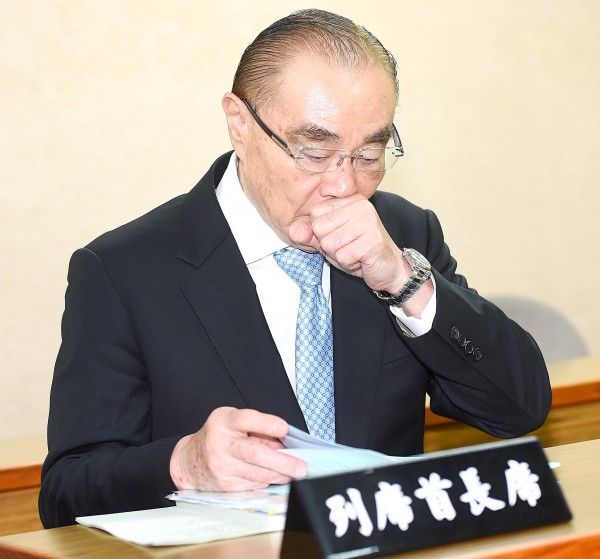《TAIPEI TIMES》 Counterdecapitation plan in place

Minister of National Defense Feng Shih-kuan yesterday speaks at a question-and-answer session at the Legislative Yuan in Taipei. Photo: Chu Pei-hsiung, Taipei Times
MAINTAINED: A unit of the 66th Brigade was moved closer to Taipei to fend off a potential military strike, and its training has been ongoing, a defense official said
By Aaron Tu and Jake Chung / Staff reporter, with staff writer
The military is capable of defending against “decapitation strike” strategies aimed at the nation, Minister of National Defense Feng Shih-kuan (馮世寬) said at a meeting of the legislature’s Foreign and National Defense Committee yesterday.
Responding to questions from Democratic Progressive Party (DPP) Legislator Wang Ding-yu (王定宇), Office for Operations and Planning Director Lieutenant General Chiang Chen-chung (姜振中) said that the nation had a dedicated military unit to defend Taipei.
The Marines 66th Brigade, based in New Taipei City’s Linkou Township (林口), was established in 2005 and is responsible for defending Taipei against decapitation strikes.
In April, the brigade moved one infantry battalion to Fuxinggang (復興崗) in Taipei’s Beitou District (北投) to improve its response time.
In July, a drill simulating a political-military strike against Taiwan seeking to overthrow its leadership was conducted, Chiang said, adding that the 66th Brigade has maintained its original structure and training.
Furthering the capabilities of the unit has been given priority in past years, Chiang said.
When asked if Taiwan has any units capable of launching decapitation strikes equivalent to the various US special forces units, such as the navy SEALs, the 101st Airborne Division and the 75th Ranger Regiment, Chiang said: “[We] have special forces.”
Asked if Taiwan had any plans for the implementation of decapitation strikes, Chiang said the military holds annual exercises and Wang would be welcome to attend a briefing.
The military has the capability and units to launch a decapitation strike against an enemy, Feng added.
Feng also told lawmakers that China had not reacted to Premier William Lai’s (賴清德) comments on Taiwanese independence.
Lai, at a Sept. 27 legislative meeting, said that his personal stance on Taiwanese independence had not wavered, making him the first premier to have made such comments during a legislative session.
When asked by Chinese Nationalist Party (KMT) Legislator Jason Hsu (許毓仁) yesterday whether he agreed with Lai’s comments, Feng said that he did not wish to comment on the actions or words of a higher-ranking official, adding that Lai and his Cabinet had expressed that the economy should be their primary focus.
Hsu asked whether Feng knew of Chinese plans for a 2020 attack on the nation, which some media outlets have speculated about.
Feng denied knowledge of such matters and said it was a misuse of information.
In response to KMT Legislator Johnny Chiang’s (江啟臣) question on what role Taiwan would play in the event of a US-North Korea war, Feng said that Taiwan held an important geographic position and should strive to preserve cross-strait peace.
Additional reporting by CNA
新聞來源:TAIPEI TIMES
















